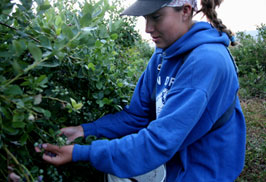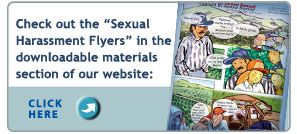
A common frame of knowledge and education is needed to provide victims of sexual violence with need-specific services. Photo by David Bacon.
While working on workplace sexual harassment cases, other staff have recognized that legal rights are only one small piece of the puzzle for women living in rural communities. "There were a number of other needs they have related to the harassment they suffered," says Mike Meuter, CRLA's Director of Litigation, Advocacy & Training in Salinas.
 As CRLA staff began informally asking other agencies about ways in which sexual violence affects women farm workers, it became clear that a common frame of knowledge and education was needed to provide victims of sexual violence with need-specific services. Such needs include health and mental health services as well as greater understanding from law enforcement agencies. Says Meuter, "we realized that if we better understood what every (agency's) piece was and where they overlap, we could try to build a better network and better support system for farm worker women."
As CRLA staff began informally asking other agencies about ways in which sexual violence affects women farm workers, it became clear that a common frame of knowledge and education was needed to provide victims of sexual violence with need-specific services. Such needs include health and mental health services as well as greater understanding from law enforcement agencies. Says Meuter, "we realized that if we better understood what every (agency's) piece was and where they overlap, we could try to build a better network and better support system for farm worker women."
What Meuter learned from talking to advocates in other professions was overwhelming: "All of the agencies we spoke with were in agreement with our analysis-that there was a lack of resources for people working with Spanish-speaking immigrant rural communities," he says.
CRLA partnered with a host of other organizations, including Lideras Campesinas, the Victim Rights Law Center, and Esperanza: The Immigrant Women's Legal Initiative of the Southern Poverty Law Center to research and publish a remarkable new resource: A series of guidebooks for service providers in farm worker communities titled "Sexual Violence Against Farmworkers." Available in English and Spanish, the illustrated and guidebooks are dense


